16 start with C start with C
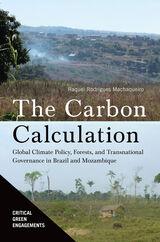
Focusing on REDD+ (Reducing Emissions from Deforestation and Forest Degradation), the book demonstrates how industrialized countries are able to maintain their socioeconomic models largely unaltered while claiming to address global warming using forests in the Global South to offset their pollution. By examining the creation and implementation of REDD+ historically and ethnographically, the book traces the social life of this mechanism as it travels across a complex network spanning several interacting levels: international, national, and local. Through cases in the Brazilian state of Acre and the Zambézia province in Mozambique, the author demonstrates how global climate policy has created new opportunities and rationales for unprecedented levels of intervention in the Global South—all under the guise of saving the planet.
The Carbon Calculation critically highlights the ways in which politics has reinforced a scientific focus on one possible solution to the problem of climate change—namely those that largely absolve the industrialized world from undertaking politically painful transformations in its own economic model.

International water expert Brian Richter argues that sustainable water sharing in the twenty-first century can only happen through open, democratic dialogue and local collective action. In Chasing Water, Richter tells a cohesive and complete story of water scarcity: where it is happening, what is causing it, and how it can be addressed. Through his engaging and nontechnical style, he strips away the complexities of water management to its bare essentials, providing information and practical examples that will empower community leaders, activists, and students to develop successful and long-lasting water programs.
Chasing Water will provide local stakeholders with the tools and knowledge they need to take an active role in the watershed-based planning and implementation that are essential for water supplies to remain sustainable in perpetuity.
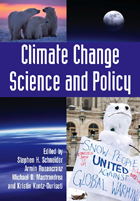
In many ways, this volume supersedes the Fourth Assessment Report of the Intergovernmental Panel on Climate Change (IPCC). Many important developments too recent to be treated by the 2007 IPCC documents are covered here. This book considers not only the IPCC report, but also results of the UN Framework Convention on Climate Change held in Bali in December 2007, as well as even more recent research data. Overall, Climate Change Science and Policy paints a direr picture of the effects of climate change than do the IPCC reports. It reveals that climate change has progressed faster than the IPCC reports anticipated and that the outlook for the future is bleaker than the IPCC reported.
In his prologue, John P. Holdren writes that the widely-used term “ global warming” is a misnomer. He suggests that a more accurate label would be “ global climatic disruption.” This volume, he states, will equip readers with all they need to know to rebut the misrepresentations being propagated by “ climate-change skeptics.” No one, he writes, will be a skeptic after reading this book.
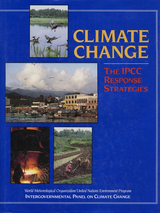
Climate Change is the report of Working Group III of the Intergovernmental Panel on Climate Change (IPCC), established in 1988 by the World Meteorological Organization and UNEP to address the threat of global warming on an international scale.

Climate Solutions Consensus presents an agenda for America. It is the first major consensus statement by the nation’s leading scientists, and it provides specific recommendations for federal policies, for state and local governments, for businesses, and for colleges and universities that are preparing future generations who will be dealing with a radically changed climate. The book draws upon the recommendations developed by more than 1200 scientists, educators and decision makers who participated in the National Council for Science and the Environment’s 8th National Conference on Science, Policy and the Environment.
After presenting a lucid narrative of the science behind climate change and its solutions, Climate Solutions Consensus presents 35 practical, results-oriented approaches for minimizing climate change and its impacts. It clearly spells out options for technological, societal, and policy actions. And it deals head-on with controversial topics, including nuclear energy, ocean fertilization and atmospheric geo-engineering.
One of the book’s key conclusions is that climate solutions are about much more than energy sources. They involve re-examining everything people do with an eye toward minimizing climate impacts. This includes our eating habits, consumption patterns, transportation, building and housing, forestry, land use, education, and more. According to these scientists, the time to act is now. With clarity and urgency, they tell us exactly what needs to be done to start reversing the driving factors behind climate change, minimizing their consequences, and adapting to what is beyond our power to stop.
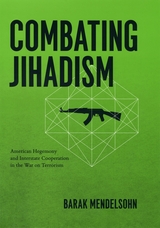

When Empire appeared in 2000, it defined the political and economic challenges of the era of globalization and, thrillingly, found in them possibilities for new and more democratic forms of social organization. Now, with Commonwealth, Michael Hardt and Antonio Negri conclude the trilogy begun with Empire and continued in Multitude, proposing an ethics of freedom for living in our common world and articulating a possible constitution for our common wealth.
Drawing on scenarios from around the globe and elucidating the themes that unite them, Hardt and Negri focus on the logic of institutions and the models of governance adequate to our understanding of a global commonwealth. They argue for the idea of the “common” to replace the opposition of private and public and the politics predicated on that opposition. Ultimately, they articulate the theoretical bases for what they call “governing the revolution.”
Though this book functions as an extension and a completion of a sustained line of Hardt and Negri’s thought, it also stands alone and is entirely accessible to readers who are not familiar with the previous works. It is certain to appeal to, challenge, and enrich the thinking of anyone interested in questions of politics and globalization.
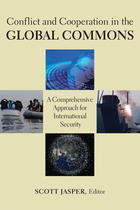
More than ever, international security and economic prosperity depend upon safe access to the shared domains that make up the global commons: maritime, air, space, and cyberspace. Together these domains serve as essential conduits through which international commerce, communication, and governance prosper. However, the global commons are congested, contested, and competitive. In the January 2012 defense strategic guidance, the United States confirmed its commitment “to continue to lead global efforts with capable allies and partners to assure access to and use of the global commons, both by strengthening international norms of responsible behavior and by maintaining relevant and interoperable military capabilities.”
In the face of persistent threats, some hybrid in nature, and their consequences, Conflict and Cooperation in the Global Commons provides a forum where contributors identify ways to strengthen and maintain responsible use of the global commons. The result is a comprehensive approach that will enhance, align, and unify commercial industry, civil agency, and military perspectives and actions.
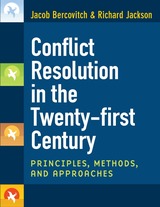
Conflict Resolution in the Twenty-first Century is not only an essential introduction for students and scholars, it is a must-have guide for the men and women entrusted with creating stability and security in our changing world.
Cover illustration © iStockphoto.com

Conservation Across Borders presents a broad overview of the history of transboundary conservation efforts and an accessible introduction to current issues surrounding the subject. Through detailed examinations of two initiatives, the International Sonoran Desert Alliance (ISDA) and the Yellowstone to Yukon Initiative (Y2Y), the book helps readers understand the benefits and challenges of landscape-scale protection.
In addition to discussing general concepts and the specific experience of ISDA and Y2Y, the author considers the emerging concept of "conservation effectiveness" and offers a comparative analysis of the two projects. The book ends with a discussion of the complex relationships among civil society, governments, and international borders.
By considering the history, goals, successes, and failures of two divergent initiatives, the book offers important insights into the field of transborder conservation along with valuable lessons for those studying or working in the field.

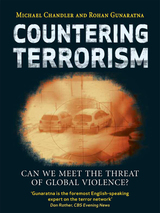
Five years after 9/11, we question whether or not terrorist activity has actually decreased. Terrorist networks still span the globe and, some argue, they are more powerful than ever. Yet in this era of rigid security and U.S.-led wars on multiple continents, countries are at odds about how to deal with the looming threat—and chaotic aftermath—of terrorist acts. In Countering Terrorism, Rohan Gunaratna and Michael Chandler sift through political commentary, military maneuvering, and the tangled web of international diplomacy to put us on alert: The world has missed a prime opportunity to crush terrorism.
Chandler and Gunaratna are among the world’s foremost experts on international terrorism, having logged between them over forty years of firsthand experience in the field and planning rooms, analyzing and dealing with an unceasing succession of terrorist threats and conflicts. Chandler and Gunaratna employ their unparalleled expertise to probe the catastrophic attacks so indelibly seared into the history of the early twenty-first century, from 9/11 to the Madrid bombings to deadly strikes in Afghanistan, Iraq, Pakistan, Palestine, and elsewhere. They ask the hard questions we never hear on nightly newscasts: Why has the overall response to terrorism after 9/11 been “so abysmal, slow, piecemeal, and to a large extent far from effective?” Why have some countries, despite international criticism, disregarded universally accepted humanitarian norms when handling the prosecution of terrorist suspects?
By allowing politics to trump the need for trans-national cooperation, the authors contend, the international community—and particularly the United States—has squandered an opportunity to combat terrorism with a united and powerful force. Thus what should have been a watershed moment in international relations vanished as effective long-term policies were shunned in favor of short-term political expediency.
From arguing the Iraq War has been a “strategic defeat” to Afghanistan’s struggle against the Taliban to the rapidly growing geopolitical role of Iran, Countering Terrorism investigates the reality of the changes that followed the bombings and attacks and examines global terrorism from every angle, including the social and economic underpinnings of terror networks. Scholars, experts, and citizens have appealed for a re-evaluation of today’s increasingly ineffective “War on Terror” policies, and Chandler and Gunaratna answer this call with clear and concise proposals for future dealings with global terrorism.
The projected end results of the wars, terrorist attacks, and political upheavals tearing nations apart today are rarely anything but bleak. But Countering Terrorism challenges today’s chaotic status quo, offering penetrating analysis and a radically new perspective essential to grappling with the complexities of terrorist activity and counterintelligence today.
"A timely book that fills a lacuna in the counter-terrorism literature and has to be on the bookshelf of any decision-maker, scholar, student and anyone who is interested in understanding the current and the future trends of international terrorism and the strategies that has to be taken to combat this threat."--Dr. Boaz Ganor, author of The Counter-Terrorism Puzzle: A Guide for Decisionmakers

A COVID Charter, A Better World outlines the steps needed to reform public policies and fix the structural vulnerabilities that the current pandemic has made so painfully clear. Leading scholar Toby Miller argues that we must resist neoliberalism’s tendency to view health in terms of individual choices and market-driven solutions, because that fails to preserve human rights. He addresses the imbalance of geopolitical power to explain how we arrived at this point and shows that the pandemic is more than just a virus—it’s a social disease. By examining how the U.S., Britain, Mexico, and Colombia have responded to the COVID-19 crisis, Miller investigates corporate, scientific, and governmental decision-making and the effects those decisions have had on disadvantaged local communities. Drawing from human rights charters ratified by various international organizations, he then proposes a COVID charter, calling for a new world that places human lives above corporate profits.

This study portrays individuals, organizations, and events that contributed to the development of the world movement for women's rights between 1848 and 1948.
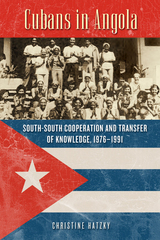

Intentional destruction of cultural heritage has a long history. Contemporary examples include the Bamiyan Buddhas in Afghanistan, mosques in Xinjiang, mausoleums in Timbuktu, and Greco-Roman remains in Syria. Cultural heritage destruction invariably accompanies assaults on civilians, making heritage attacks impossible to disentangle from the mass atrocities of genocide, war crimes, crimes against humanity, and ethnic cleansing. Both seek to eliminate people and the heritage with which they identify.
Cultural Heritage and Mass Atrocities assembles essays by thirty-eight experts from the heritage, social science, humanitarian, legal, and military communities. Focusing on immovable cultural heritage vulnerable to attack, the volume's guiding framework is the Responsibility to Protect (R2P), a United Nations resolution adopted unanimously in 2005 to permit international intervention against crimes of war or genocide. Based on the three pillars of prevent, react, and rebuild, R2P offers today's policymakers a set of existing laws and international norms that can and—as this book argues—must be extended to the protection of cultural heritage. Contributions consider the global value of cultural heritage and document recent attacks on people and sites in China, Guatemala, Iraq, Mali, Sri Lanka and Afghanistan, Syria, and Yemen. Comprehensive sections on vulnerable populations as well as the role of international law and the military offer readers critical insights and point toward research, policy, and action agendas to protect both people and cultural heritage. A concise abstract of each chapter is offered online in Arabic, Chinese, French, Russian, and Spanish to facilitate robust, global dissemination of the strategies and tactics offered in this pathbreaking call to action.
The free online edition of this publication is available at getty.edu/publications/cultural-heritage-mass-atrocities. Also available are free PDF, EPUB, and Kindle/MOBI downloads of the book.
READERS
Browse our collection.
PUBLISHERS
See BiblioVault's publisher services.
STUDENT SERVICES
Files for college accessibility offices.
UChicago Accessibility Resources
home | accessibility | search | about | contact us
BiblioVault ® 2001 - 2024
The University of Chicago Press









